Most recently, the hurricanes in the Caribbean in Fall 2017 brought me to ground zero in Texas and in the Florida Keys. I had given thousands of hours of volunteer service to communities around the world while having neglected what happens in my own backyard. A common misconception is that rich countries don’t require help after a natural disaster. Sure, rich countries have a higher capacity to respond, likely have better preparedness plans and better response procedures, however people still manage to fall through the cracks. Knowing that this was a reality, I decided to help out our neighbours to the south.
Having arrived in Aransas Pass, Texas a week after Hurricane Harvey, the air was thick with humidity, trees were littering driveways and standing water was still spotted in places. Having once stayed through a super-typhoon packing wind gusts of 285kph, the confusion of being in such a freshly damaged place was all-too-familiar. Walking out to the mounds of twisted metal, entire roofs peeled off and cars filled with water is a humbling experience. It makes you feel small, anxious and defenseless, however it gives you a clear direction to start building back hope. Political, religious, social or cultural lines that perhaps were visible once upon a time, are no longer visible because the priority has shifted to survival. Witnessing former strangers prop each other up reminds you that given the right conditions, people will always choose to be resilient and loving towards each other, and that, is a sight worth seeing. This is something I had seen previously on other projects, but there is something to be said about Texas pride. The sense of community was the biggest takeaway from my four weeks in Texas. Church groups, food trucks, shower trailers from all across the state converged on the Gulf coast ready to help for as long as needed. Entire families would arrive and turn helping out into a fun family outing. It was, what you would hope to see happen in a disaster zone.
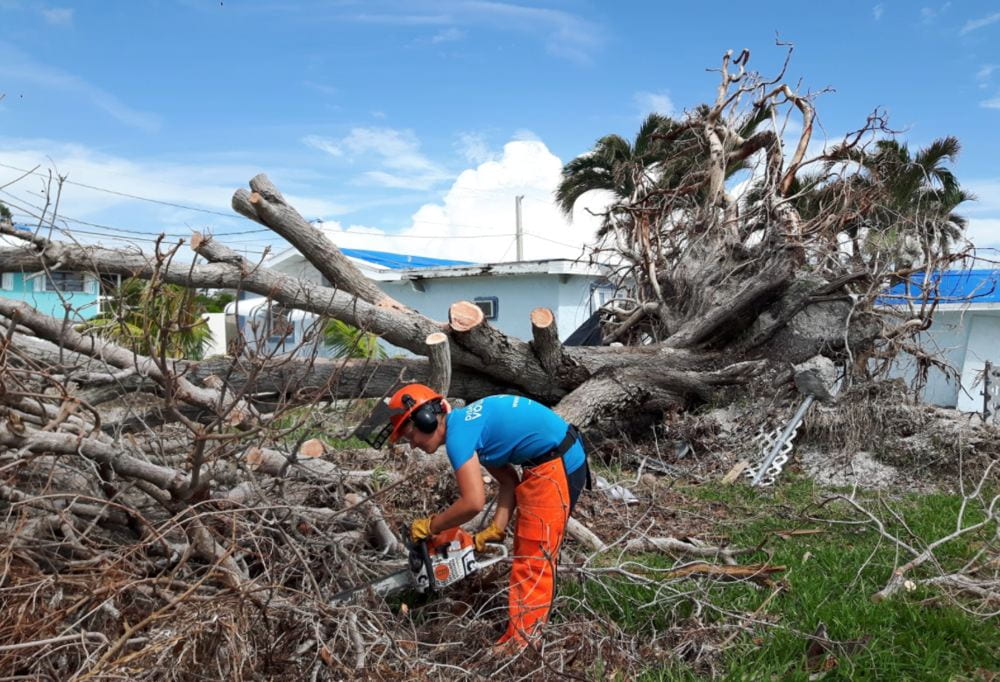
Abby, a Florida native, bucking up a large mahogany tree on Big Pine Key in Florida. 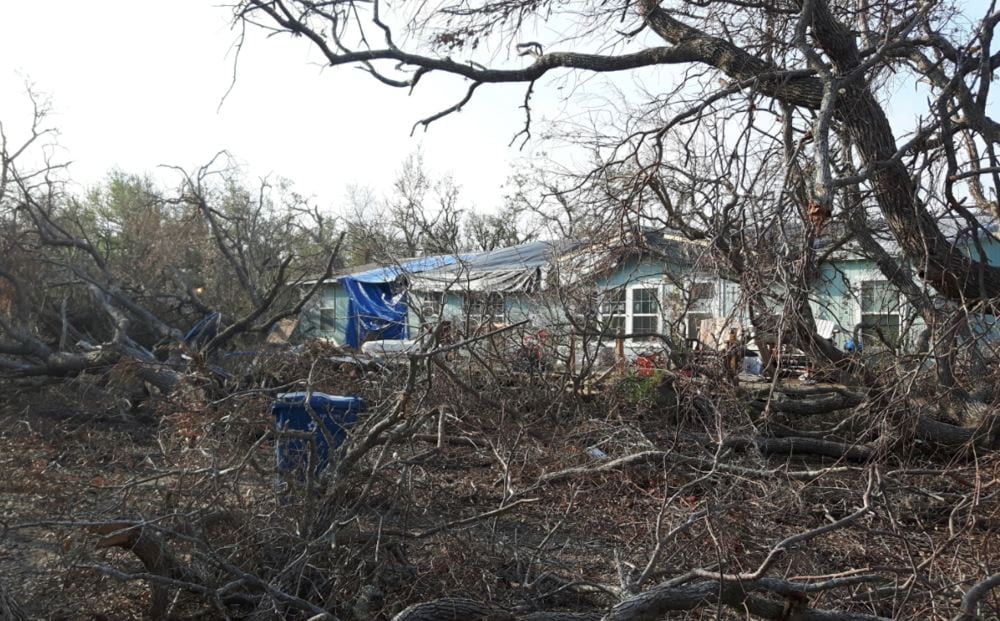
A home surrounded by downed trees in Aransas Pass, Texas after Hurricane Harvey. 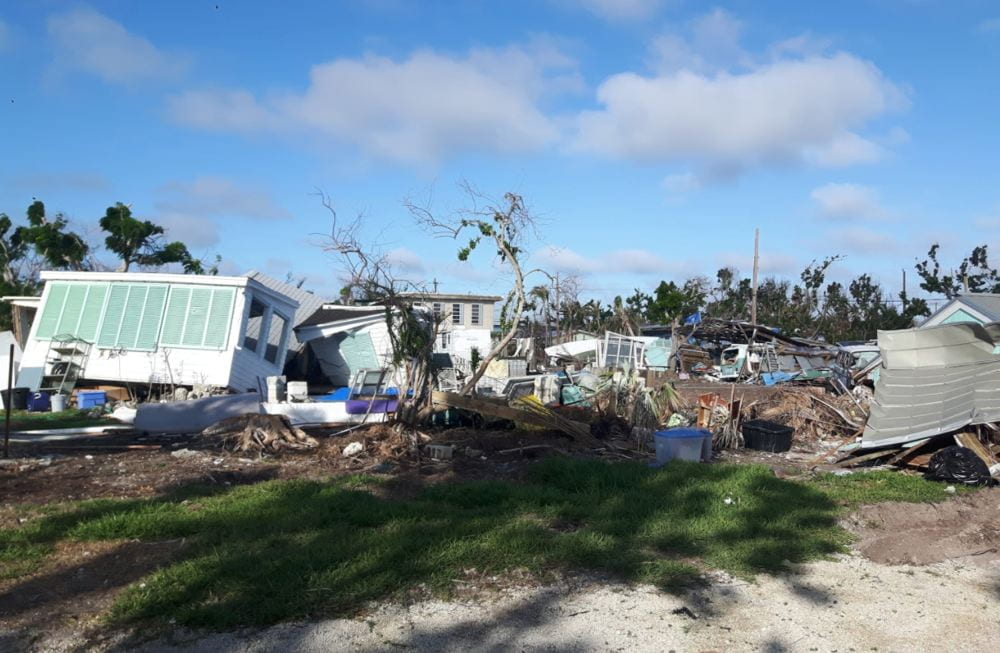
One of the worst hit neighbourhoods on Big Pine Key. Several houses in these avenues were condemned, having been shifted off their foundations from the storm surge. 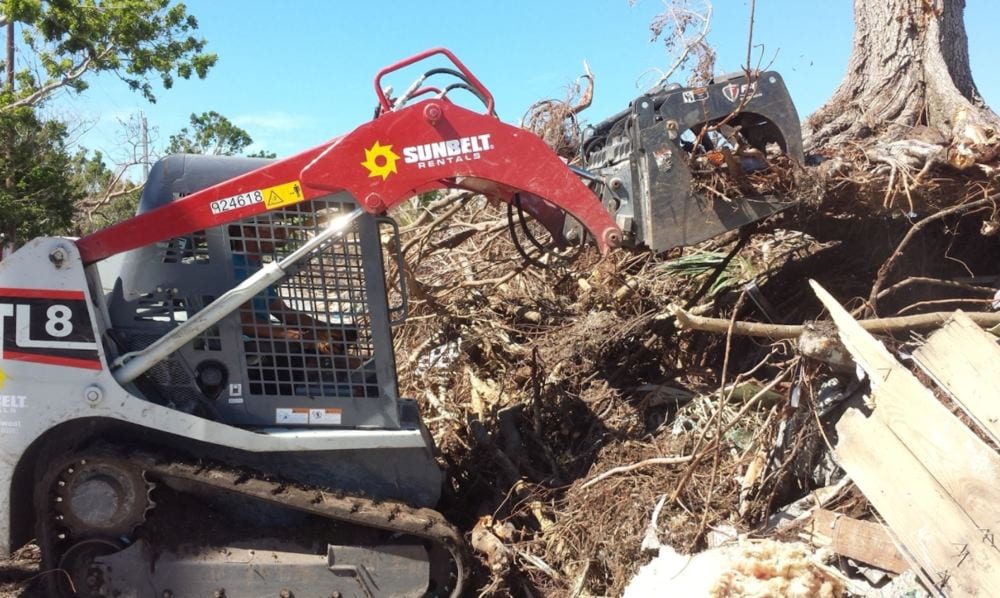
We had a skid steer rental provided to us from the Rotary Club of the Keys, so we took full advantage of that in cleaning up downed trees and household debris.
With a short week-long break back in Canada, I flew down to help the chainsaw program on a volunteer project on Big Pine Key in Florida. The scale of destruction from Hurricane Irma was like none other than I have seen. One only needs to look as far as Google images to get a snapshot of the 2 million tons of debris that were projected to have been created in the Florida Keys. It was difficult seeing homeowners confused and unsure where to go for help. Homeowners had been warned of contractor fraud and were battling their insurance companies for coverage. Already feeling down and out, our volunteer service lifted their spirits. It wasn’t long before we were being recognized in grocery stores, at gas stations or in airports.
These two projects in the United States were structurally very different from the more international projects. We were housed in churches, just about the only available space after a disaster that is willing to shelter 20-40 volunteers. Language barriers were of no concern like they were in the Philippines, Greece or Nepal. Insurance adjusters and insurance claims were hurdles for our work whereas in the Philippines or in Nepal, if something needed to be done, it was done. Texans and Floridians were receiving federal support and state support, this was much less apparent in the Philippines and in Nepal. What was most shocking to me, and what could be expected of most over-developed countries under the same circumstances is the amount of debris from the storm. Evidence of a consumption culture everywhere you went. Cars, boats, flooring, drywall, insulation, refrigerators, stoves, dishwashers, toys, books, anything you could think of, was being piled up on the roadside to be picked up and disposed of elsewhere. Having this out-of-sight-out-of-mind debris removal service was quite convenient, but really made me wonder where these two million tons of debris were going. It also made me realize how big our footprints can be once we decide to buy in to a consumer-based lifestyle. These aren’t all necessities. I won’t get into the psychology of spending habits, but it was troubling to see the amount of things rendered useless after the storm because “my insurance company will compensate me for a new one”.
This past year, 2017, was a particularly bad season for storms. The US mainland saw some of the strongest storms to ever make landfall. Some islands in the Caribbean essentially got wiped off the map. Families will be rebuilding for years to come. These aren’t pleasant atmospheres to touch down in, but I would much rather be in the field helping out than change the channel on my remote.
Two key lessons from Texas and Florida:
- You will never fully know your impact. Quantitative measures from a program’s success or a program’s reach can only go so far. I have always maintained that I will never fully know the positive spinoff of my actions. I can quantify the number of projects I have been on, the number of houses and schools I have helped build, the number of houses and schools I have helped demolish, the number of hours I have contributed to volunteer service, but those only tell part of the story. Perhaps I have motivated people to follow in my footsteps, perhaps I haven’t. Perhaps I have made people regain their hope in humanity, perhaps I haven’t. Those elements are out of my control. Across all metrics, I hope and trust that I have made a quiet positive impact in someone’s life out there.
- Approach every day in a disaster zone as if there is something new to learn. A disaster zone professional does not exist. One cannot tame a disaster zone because they are constantly in flux, and therefore the best you can do is to adapt. Certain lessons can be learned and applied between disasters, but the variability will make it so that you will be on your toes regardless of how much experience you have. Cherish this feeling, you won’t get bored if you are willing to learn and adapt.
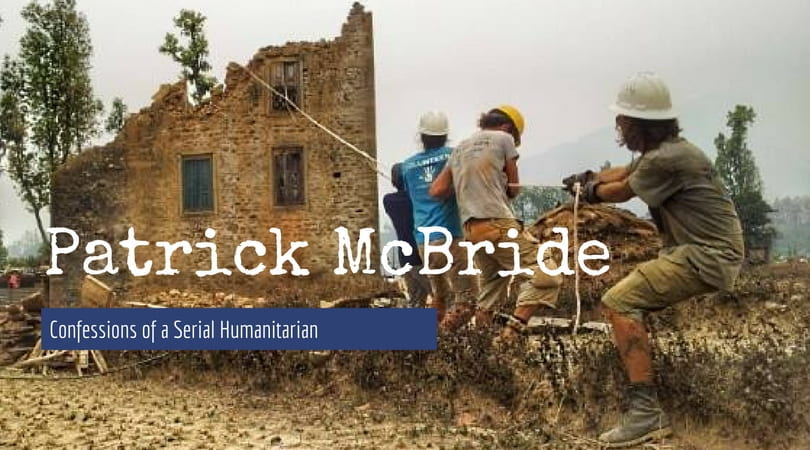
Patrick McBride, Guelph IDS graduate (2011), reflects on his life in multiple disaster and crisis zones in the Philippines, Greece, Nepal and the United States over the last four years. In this six-part series, Pat shares his unique experiences rebuilding homes and hope in some of the worst crises of our century. If you have questions for Patrick, he can be reached at patrick.mcbride01@gmail.com, or follow his adventures on Instagram: @sea.nugget

